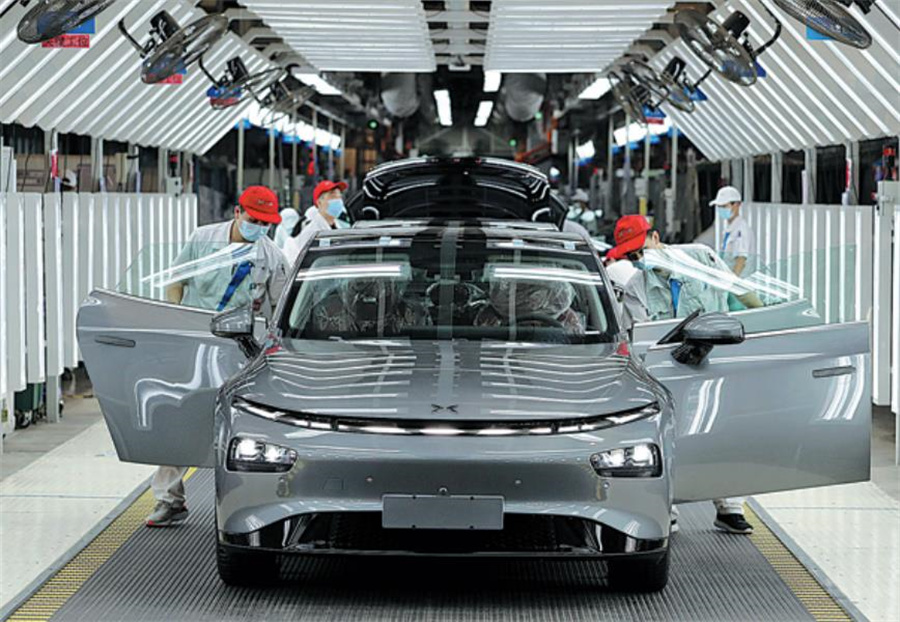Electric cars hit highway to the future

Workers assemble cars at Xpeng Motors' production base in Zhaoqing, Guangdong province, in April. [Wang Zhuangfei/China Daily]
Qin Lihong, president of Chinese electric car startup Nio Inc, said support for the sector highlights its strategic importance, paving the way for further development.
"We (Chinese companies) are already at a great starting point and we should seize the opportunities to prepare for competition in the next 10, 20 or even more years to come," he said.
In 2009, China started to develop the sector in earnest at a time when many other countries thought it was too early to do so. NEVs are expected to account for 20 percent of new car sales in 2025, rising to 40 percent in 2030 and 50 percent in 2035.
Thanks to a clear strategy and generous subsidies, China has been the leading market for electric cars and plug-in hybrids since 2015. Its first-mover advantage and vast market have seen local companies enhance their reputations globally.
For example, BYD, which is backed by United States investor and businessman Warren Buffett, sells its buses worldwide, while leading battery maker CATL is in demand among car giants such as BMW and Daimler to power their electrification campaigns.
Chinese electric car startups, including US-listed Nio and Xpeng Motors, are now serious challengers to Tesla in terms of brand awareness and products.
Since its launch in July last year, the Wuling Hongguang mini car, with its styling and affordability, has been the most popular electric vehicle in China.
Duan Yan, a representative from the company, said more than 200 car dealers from a total of 70 or so countries and regions had been in touch to say they wanted to sell the model if it was exported.
International carmakers are tapping into the Chinese market and manufacturing expertise. Volkswagen, which is launching five electric car models in China this year, expects their combined sales to reach 100,000 by the end of December.
Tesla is busy building charging infrastructure for a rising number of Chinese customers. Annual capacity at its Shanghai plant, which started production in late 2019, has just been raised to 450,000 vehicles.
The company said in a statement, "Due to strong US demand and global average cost optimization, we have completed the transition of Gigafactory Shanghai as the primary vehicle export hub."
Cooperation opportunities
While China is leading the transformation toward electrification, the European Union and the US have announced far-reaching plans in this regard.
This month, the US government set a target for NEVs to comprise 50 percent of the nation's car sales by 2030.
Large US carmakers, including General Motors and Ford, which are expected to contribute a significant proportion of the sales, said the target would mark a dramatic shift for the domestic market.
According to PwC, from January to June, such vehicles accounted for only 3 percent of total sales in the US-the second-largest vehicle market after China.
In a joint statement, GM and Ford said the 50 percent goal "can be achieved only with the timely deployment of the full suite of electrification policies".
This would involve "purchase incentives, a comprehensive charging network of sufficient density to support the millions of vehicles these targets represent, investments in research and development, and incentives to expand the electric vehicle manufacturing and supply chains in the United States".
Cui Dongshu, secretary-general of the China Passenger Car Association, said the massive shift by the US toward electrification would help promote the transformation led by China, adding that there is huge potential for cooperation.
























